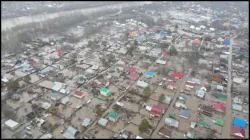Russians stage rare protest as dam burst triggers severe floods in Orenburg, thousands at risk | VIDEO
Russia declared a 'federal emergency' in the flood-hit areas of Orenburg, where more than 10,000 homes are submerged and 4,000 people have been evacuated. The water levels are expected to rise due to swiftly melting snow across swathes of the Ural Mountains and Siberia.

Moscow: A rare protest by Russians was witnessed in the Orsk city on Monday, who called for compensation following a dam burst that triggered devastating floods in the Orenburg region near the border with Kazakhstan. The severe floods were caused by the rising water levels in the Ural River and forced over 4,000 people, including 885 children, to evacuate the region, according to the regional government.
Protests are rarely seen in Russia as authorities have imposed crackdowns on any form of dissent following President Vladimir Putin's decision to invade Ukraine. Nonetheless, hundreds of people gathered in front of the administrative building in Orsk Monday, according to Russian media, while videos shared on Russian social media channels showed people chanting “Putin, help us,” and “shame.”
Critical situation in Orenburg
According to TASS news agency, more than 10,000 homes, including some 7,000 in Orsk, were flooded in the region and floodwaters in the city are continuing to rise. Footage from Orsk and Orenburg showed water partially submerging buildings, including homes, as well as nearby fields. Flood sirens blared out in two cities urging people to evacuate immediately as two major rivers swelled to bursting point.
Swiftly melting snow across swathes of the Ural Mountains and Siberia has swelled some of the biggest rivers which surge across the wilds of Russia, with at least 10,500 homes recorded as flooded so far and many thousands more at risk. The peak is expected in Orenburg on Wednesday. The streets on the outskirts of Orenburg turned into waterways and the people swapped their cars for boats to move around.
The Kremlin said on Tuesday that President Vladimir Putin was focused on dealing with flooding but that the most difficult days were still ahead for the Kurgan and Tyumen regions. The Kremlin said Russian President Vladimir Putin had discussed the situation by telephone with President Kassym-Jomart Tokayev of Kazakhstan, which has also been badly hit by flooding.
Russia and Kazakhstan have now ordered more than 100,000 people. The most severely hit areas are Atyrau, Aktobe, Akmola, Kostanai, Eastern Kazakhstan, Northern Kazakhstan and Pavlodar regions, most of which border Russia and are crossed by rivers originating in Russia such as the Ural and the Tobol. In Orenburg, a city of more than half a million, residents paddled along roads as if they were rivers.
Worst flooding in 70 years
Russia's government declared the situation in flood-hit areas of Orenburg a federal emergency on Sunday, with preparations for possible flooding underway in three other regions, state media reported. This is reportedly some of the worst flooding the country has experienced in the last 70 years. A criminal probe has been launched to investigate suspected construction violations that may have caused the dam to break.
Following the protest, the governor of the Orenburg region, Denis Pasler, promised compensation payments of 10,000 rubles a month (approximately $108) for six months to people forced out of their homes by the flood. The total damage from the flood in the region is estimated at about 21 billion rubles ($227 million), the regional government said on Sunday.
The designation of the situation as a federal emergency reflects the risk of flooding beyond the Orenburg region. Kremlin spokesman Dmitry Peskov on Sunday said that Russian President Vladimir Putin had spoken with the head of the Ministry of Emergency Situations, as well as the heads of the Kurgan and Tyumen regions, located in the Ural Mountains area, to discuss the situation and “the need ... for early adoption of measures to assist people and their possible evacuation.”
The Ural River, about 2,428 kilometres (1,509 miles) long, flows from the southern section of the Ural Mountains into the north end of the Caspian Sea, through Russia and Kazakhstan. The river burst through an embankment dam on Friday flooding the city of Orsk just south of the Ural Mountains.
(with inputs from agencies)